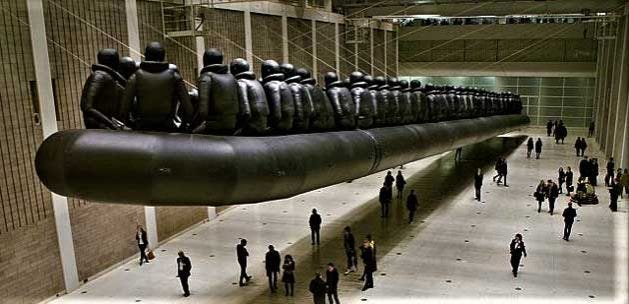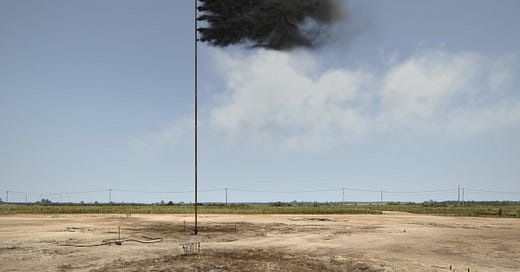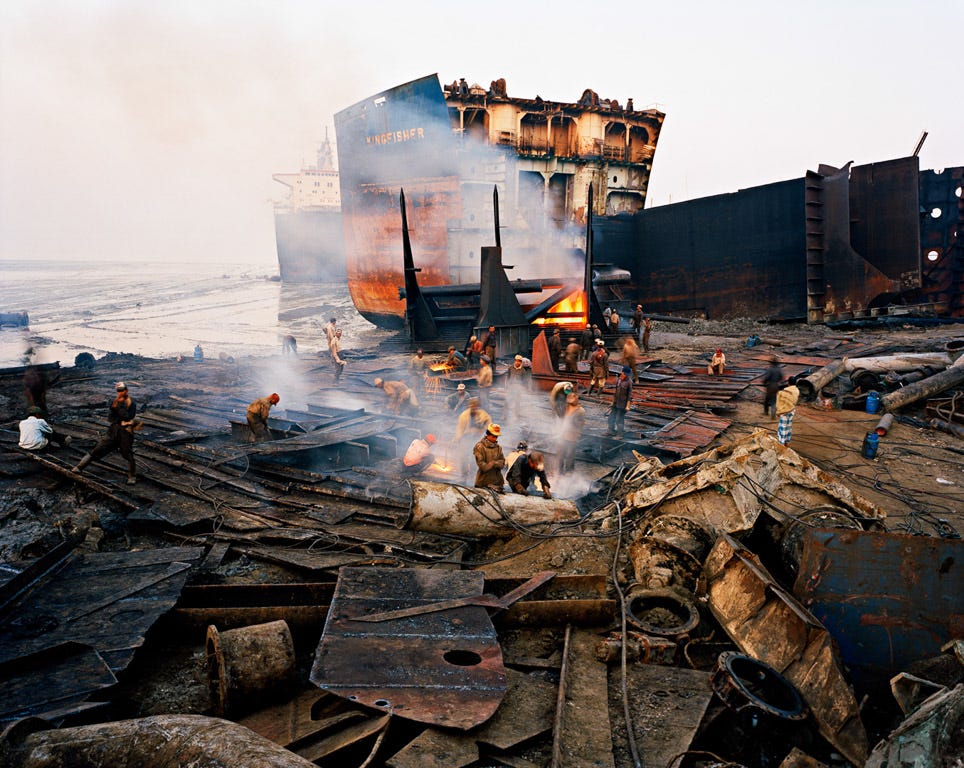Capitalism is dead. Now we have something much worse
The Cloud and the Canal: A Tale of a New Capitalism
Welcome to the Age of Finitude.
Greenland, Tariffs, Canada, the Panama Canal, it’s been really hard for me to make sense of what’s been happening so quickly over the past 2 weeks.
Fortunately I stumbled upon a French podcast where historian Arnaud Orain is interviewed about his latest book (in French) that could be translated as “The Confiscated World: An Essay on Finitude Capitalism (16th-21st Century)”
The world is changing in ways that challenge our basic assumptions about capitalism, a change only made more drastic and inexorable in the past 2 weeks and the flurry of executive actions by the new President.
In a nutshell, we see a return to 16th/18th century mercantilism - in a finite world - How one nation could only become richer at the expense of others.
It’s the victory of merchants over producers, of warehouses over factories, of traders over investors.
For centuries, the ‘traditional’ liberal capitalism operated on an optimistic promise of endless growth and unlimited opportunities. New markets could always be found, new resources discovered, new territories explored.
This was the classic story of 'growing the pie' - the belief that economic expansion would create prosperity for all.
But we're entering a different era – what Arnaud Orain calls "finitude capitalism" – where the limits of our planet are reshaping how economic power works.
The pie can't grow anymore, and instead of a bigger pie, powerful actors are now scrambling to secure and control the existing slices.
And actually, our earth is actually "finite" several times over: finite in resources, finite in waste absorption capacity, finite in climate resilience.
The Return of Geography
Look at recent developments: Countries scrambling for control of Greenland's minerals and maritime routes, tensions over the Panama Canal, China building new Silk Roads across Eurasia. These aren't just random events – they're symptoms of a profound shift. In a world of finite resources and strategic bottlenecks, controlling physical space and infrastructure becomes crucial again.
The Paradox of Melting Routes
Perhaps nothing better illustrates our new era's sad ironies than the Arctic. Climate change – itself a product of our unsustainable exploitation of finite resources – is melting polar ice caps, opening new maritime routes that could revolutionize global trade. The Northwest Passage through Greenland could cut shipping times between Asia and Europe by days if not weeks. It's a bitter irony: the very crisis that demonstrates our planet's limits is creating new strategic opportunities for resource extraction and trade. This explains the sudden great power interest in Greenland – it's not just about minerals and REEs, but about controlling these emerging Arctic passages.

Chokepoints and Vulnerability
The recent Houthi attacks in the Red Sea offer a reminder of how vulnerable the global trade system is to disruption at key chokepoints. When a relatively small force can threaten one of the world's crucial maritime passages, forcing ships to take longer, costlier routes around Africa, it demonstrates how the control of strategic infrastructure has become a powerful geopolitical lever. These aren't just military or political actions – they're expressions of how power works in an age of finite routes and resources.
The Critical Role of Maritime Routes
Understanding today's power struggles requires grasping a crucial fact: maritime shipping remains the bulk of global trade, accounting for roughly 80% of global trade volume (and 70% in value) - a shocking number. When Houthi forces disrupt Red Sea shipping lanes, or when China builds new ports along its Maritime Silk Road, they're not just affecting local regions – they're wielding power over the arteries of global commerce. This explains why control of maritime chokepoints, from the Panama & Suez Canals to the Strait of Malacca, and Greenland, has become increasingly crucial in finitude capitalism.
From Profit to Rent: The New Economic Logic
This new capitalism operates differently from the old model of market competition and profit-making. Instead, it increasingly works through rent – extracting value by controlling access to essential resources, lands and infrastructure. Think of it as a kind of modern feudalism (as explained in his brilliant book by Yannis Varoufakis), but instead of controlling land, today's powers control digital networks, trade routes, and critical resources.
”Capitalism is dead. Now we have something much worse” (Yannis Varoufakis), ”We’re now in servitude, to the fiefdoms of our new global masters”.
The Cloud and the Canal: A Tale of Two Infrastructures
What do Amazon's cloud services and the Panama Canal have in common? Both are crucial pieces of infrastructure that give their controllers enormous power. Tech giants don't just make profits by selling better products – they extract rent by controlling the digital infrastructure that modern business depends on. Similarly, whoever controls key maritime passages or trade routes can extract value simply by controlling access.
The Triumph of the Warehouse
Perhaps nothing symbolizes this shift better than the changing balance between production and distribution. In today's economy, the warehouse has become more powerful than the factory. Companies like Amazon aren't primarily valued for what they produce, but for their control over the infrastructure of distribution. The merchant has triumphed over the manufacturer, and the platform over the producer.
Financial Markets: From Investment to Extraction
The transformation of financial markets also illustrates the shift from productive to extractive capitalism in our age of finitude. While financial markets once primarily served to fund productive investment – building factories, developing new products, expanding businesses – they increasingly function as sophisticated mechanisms for rent extraction and value capture.
The New Financial Infrastructure
Just as physical infrastructure (ports, canals) and digital infrastructure (cloud services, platforms, App stores) have become sources of rent extraction, financial infrastructure itself – payment systems, trading platforms, credit networks – has become a source of monopolistic rent. Those who control these financial chokepoints can extract value from every transaction that passes through them.
The Financialization of Everything
In finitude capitalism, financial markets have become experts at turning everything into assets from which rent can be extracted: Natural resources become "commodity futures", Housing becomes "MBS - mortgage-backed securities" and even future disasters become opportunities through "catastrophe bonds (CAT bonds)"
This financialization doesn't create new value – it simply creates new ways to extract and trade claims on existing value. It's the perfect expression of finitude capitalism's logic: in a world of limits, profit comes not from creating new things but from controlling and extracting value from what already exists.
From Optimism to Predation
Perhaps the most profound shift in this new era is psychological.
Traditional liberal capitalism, for all its flaws, carried a fundamentally optimistic promise: through market competition and innovation, the economic pie would grow eternally, eventually benefiting everyone.
Of course, this was always a deeply problematic narrative that masked violent realities: the "growth" of liberal capitalism was built on colonialism, slavery, resource extraction, and the brutal exploitation of both people and nature.
The "abundance" it promised for some was mostly predicated on the dispossession and impoverishment of others.
Finitude capitalism, by contrast, operates on an even darker premise. In a world of fixed or diminishing resources, success comes not from growing the pie but from controlling and capturing the existing slices. This creates a zero-sum mentality where one player's gain must be another's loss. Whether it's tech companies monopolizing digital infrastructure, nations scrambling for Arctic resources, or powers seeking to control maritime bottlenecks, the logic is predatory rather than productive.
Two Visions of Finitude
We're witnessing two radically different responses to our finite world.
One is ecological, seeking sustainable ways to live within planetary boundaries through reduced consumption, circular economies, and more equitable distribution of resources.
The other is predatory, focusing on securing control over remaining resources and crucial infrastructure – whether it's water sources, rare earth minerals, or digital networks.
This clash isn't just about different economic models; it's about fundamentally different visions of how to handle the reality of finitude. The ecological approach acknowledges multiple planetary boundaries – not just finite resources, but finite ability to absorb waste and emissions. Our earth is actually "finite" several times over: finite in resources, finite in waste absorption capacity, finite in climate resilience. The predatory approach, by contrast, simply seeks to control and monopolize what remains, potentially accelerating our collision with these various planetary limits.
The Return of Monopoly
This new model contradicts basic principles of liberal capitalism. Instead of free competition, we see the rise of new monopolies – whether in tech, logistics, or resource control. These aren't just successful companies; they're infrastructure owners who can extract rent from everyone else who needs to use their networks, platforms, or passages.
We're forced to recognize that the era of truly "free" trade might be ending. Instead, we're entering an age where control of bottlenecks – physical or digital – determines economic power.
This transformation from ‘optimistic’ liberal capitalism to pessimistic finitude capitalism represents more than an economic shift – it's a fundamental change in how we envision our collective future. The question isn't just how to distribute resources in a finite world, but whether we can find ways to transcend the predatory logic of finitude capitalism without falling back on the unsustainable promises of endless growth.








quite a wonderful article on this topic. I learned a lot and it's clear. Thank you!!